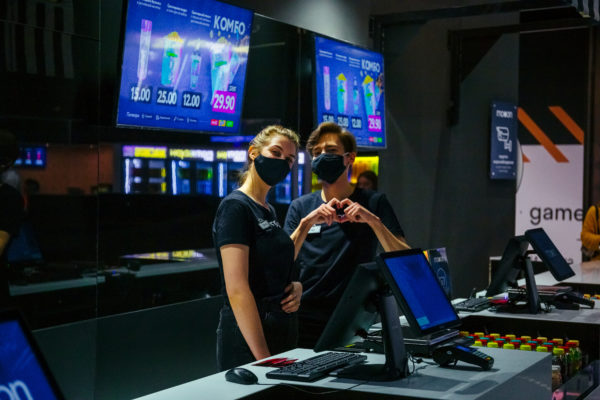“We were called crazy!,” recalls CEO Oleg Tronik, reflecting on the 2014 birth of Silver Screen Cinemas. What is now, in 2021, four theaters—with one opened in March 2021, in the midst of the Covid-19 pandemic—was then just one, but that one passed a pretty significant milestone: Silver Screen’s Galileo theater, in the capital city of Minsk, was the first multiplex in the Eastern European nation of Belarus.
Traditionally, cinemas in Belarus have either been privately owned single locations or, more frequently, theaters owned and run by the state. Prior to Silver Screen’s emergence, the former Soviet country had no chains or multiplexes to speak of. Government-owned cinemas, though well-placed in centrally located areas, typically aren’t of the highest-quality, Tronik explains—and with their standard of having one screen apiece, they certainly didn’t provide cinemagoers with much by way of variety, either among programming or the exhibition amenities that audiences in other countries have access to.
“There was no [moviegoing] culture” in Belarus, Tronik says. The country’s per capita annual movie attendance rate was the lowest of any former Soviet country. Five years and four Silver Screen multiplexes later, it’s still low, with the average person buying less than one ticket per year. Similarly, there’s little by way of a local movie scene, with most of the productions shot in Belarus originating from nearby Russia rather than local filmmakers. “But there was willingness to develop from the nation, from the people,” says Tronik. “We think that our business actually helped to develop [a moviegoing] culture [in Belarus]…. Maybe it’s a big word—but still, we think so.”
Building a cinema chain in a place where there aren’t any cinema chains—where there are no multiplexes, and cinemagoing isn’t a common past time—took experimentation. $5 million was invested in the first theater, at which pricing was set “on the level of $5 per ticket. For booking in state-owned cinemas, it’s about $2. With $5 million invested in one location, we were called crazy. But we succeeded.” Despite higher ticket prices, the Galileo welcomes over 400,000 admissions a year. Silver Screen’s second location, which opened in 2015, brought Dolby Atmos sound and recliners to Belarus for the first time; its third gave the CIS region its first ScreenX screen.
The Mooon, Silver Screen’s fourth and most recent cinema—and its first located outside of Minsk, in the city of Grodno—has a coffee shop, a self-serve snack bar, and an entertainment/gaming area for children, in addition to five auditoriums, three of which are now open—one boasting ScreenX technology, and another with tables and sofas for easier in-theater dining. “We traveled a lot,” says Tronik of how he and the rest of the Silver Screen team decided what amenities the Belarusian market would respond to. They “saw a lot of locations throughout the world—what they look like. What they offer. We tried to bring to Belarus everything that we liked in the world.” That includes another first for the chain, and indeed for Belarus: A self-serve M&M machine at the Mooon location that had to be purchased in London, because “we have no distributors here in Belarus.”
The innovations extend beyond amenities to the content on the screen; in 2019, Silver Screen had two films dubbed into the Belarusian language, a rarity in for the country and a move that was “very popular for our audience.” Alternative content, too, is an attractive prospect for the chain. Being from a small (if growing) market, “it’s not so easy,” says Tronik. Their Russian distribution partners “aren’t so interested [in alternative content]. Everything is good for them, because Russia is a big market… You don’t need to think about niche, alternative stuff.” At Silver Screen, the long-term goal is to establish an overall programming strategy that is “unique to our audience” and not so dependent on Russia, which—along with the United States—currently makes up the vast majority of Silver Screen’s programming. (They typically look at about an 80/20 split, with more films from the States, though now with Hollywood releases continuing to lag as the Russian film industry picks up steam, the split is more like 50/50.) With the addition of theater, music, and sports to Silver Screen, Tronik hopes to “make a menu for our audience… to bring everything that exists in the world. That’s the strategy. And we have a lot of work ahead of us!”
That work includes expansion. During 2020, as Covid pummeled the exhibition business, Silver Screen had to decide whether to move ahead with three contracts for new locations. In a meeting with the owners, Tronik recalls,”we decided that the crisis was the best time to develop, to grow. And we decided not to refuse these plans and to invest in new locations.” All three locations are slated to open by the end of 2022.
The growth of Silver Screen, Tronik admits, is not without its challenges. Though “we would like to be in the regional cities of the country,” they’re limited by the presence—or lack thereof—of modern shopping centers fit to host a multiplex. And there are the state-owned theaters, which by virtue of their central locations and sheer quantity still draw in the majority of the country’s audiences.
But there are some tools at Silver Screen’s disposal: For example, their exclusive rights to operate ScreenX and 4DX auditoriums in Belarus. In 2020 came another exclusive license, this time with Imax, which will have its grand entry into Belarus with Silver Screen’s fifth location, planned to open later this year. There’s been interest in the past from exhibitors in other countries looking to enter Belarus, but “we’ve built a very high limit [for competitors] to enter the market!,” says Tronik. “The technology that’s behind us, the quality, and the loyalty of our audience—I don’t know what competitors would do.”



Share this post